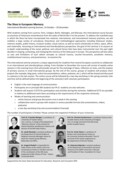
With students coming from Lucerne, Paris, Cologne, Berlin, Nijmegen, and Warsaw, this international course focuses on practices of Holocaust remembrance from the wake of World War II to the present. To address the manifold ways in which the Shoa has been incorporated into national, international, and transnational memory practices, we will mobilize a large variety of conceptual, theoretical, and methodological approaches including Holocaust studies, memory studies, public history, museum studies, visual culture, as well as recent scholarship on ethics, space, affect, and materiality. Assuming an international and interdisciplinary perspective, the goal of this seminar is to acquire an in-depth understanding of the social, political, and cultural forces that have been instrumental over the past eight decades in shaping, contesting, and reshaping the memory of the Holocaust in Europe. This perspective will also allow us uses and limitations of such salient concepts as cultural trauma, counter-monument, prosthetic memory, multidirectional memory, and postmemory. to examine the
This international seminar presents a unique opportunity for students from several European countries to collaborate in an international and interdisciplinary setting. From October to December the course will consist of weekly online sessions in the evening hours that will provide venues for the exchange of ideas, reflection on texts, and the analysis of primary sources in small international groups. By the end of the course, groups of students will produce short projects (for example, blog posts, online live presentations, videos, podcasts, etc.), which will be shared and discussed in a plenary in the last session. The online course will be followed by a two-day workshop in the spring semester (site and time will be defined before the beginning of the semester) with voluntary participation.
- English is the main language of communication.
- Participants are in principle MA students but Ph.D. students are also welcome.
- Students will acquire 3 ECTS for participation and activities during the semester. Additional ECTS are possible in relation to additional work done according to the requirements of the respective University.
Modes of teaching and communication:
- online lectures and group discussions once a week in the evening
- collaborative work in groups with outputs in various possible formats (live presentations, videos, podcasts)
- a two-day workshop (trip and accommodation financed)
The number of participants is limited. Please contact the respective Professor of your University.

